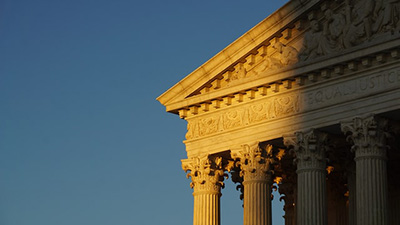
On January 13, 2022, the highest Court in the United States of America blocked the enforcement of mandatory vaccination requirements for large private companies.
Background
In National Federation of Independent Business, et al. v. Department of Labor, Occupational Safety and Health Administration, et al. (2022) the Occupational Safety and Health Administration (“OSHA”), attempted to implement a nation-wide COVID-19 vaccine mandate (“Mandate”) on November 5, 2021.
The Mandate required all employers with at least 100 or more employees to “develop, implement and enforce a mandatory COVID-19 vaccination policy” and require any workers who remain unvaccinated to undergo weekly COVID-19 testing at their own expense, on their own time and wear a mask each workday.
The Mandate was objected to and challenged by many States, businesses and non-profit organizations in Courts of Appeal across the country. The Fifth Circuit Court initially ordered that the Mandate be stopped, but the Sixth Circuit Court lifted the stay and allowed OSHA’s rule to take effect.
The Applicants sought for emergency relief from the U.S. Supreme Court, arguing that the OSHA’s mandate exceeds its statutory authority and is otherwise unlawful. The U.S. Supreme Court granted the Applicants’ applications and stayed the vaccination requirement Mandate.
Decision
Overreach in the OSHA’s Scope of Regulatory Authority
The U.S. Supreme Court held that administrative agencies, such as the OSHA, are creatures of statute and accordingly, possess only the authority that Congress has provided. The U.S. Supreme Court differentiated the power to set workplace safety standards from implementing broad public health measures:
“although congress has indisputably given OSHA the power to regulate occupational dangers, it has not given that agency the power to regulate public health more broadly.”
The U.S. Supreme Court held that although COVID-19 is a risk that occurs in many workplaces, it is not an occupational-specific hazard in most. The Court noted that COVID-19 can and does spread in schools, during sporting events and everywhere else that people gather and that the risk of COVID-19 transmission is not specific to workplaces.
The Court reasoned that by permitting the OHSA to implement the Mandate which requires, “the vaccination of 84 million Americans, selected simply because they work for employers with more than 100 employees,” it would significantly expand the OSHA’s regulatory authority without clear congressional authorization. Furthermore, the Court noted that the OSHA’s indiscriminate approach in implementing the Mandate, takes on the character of a general health measure, rather than an occupational safety or health standard.
“Work-related dangers” applied too broadly
By requiring all employers with at least 100 employees, “to ensure their workforces are fully vaccinated or show a negative test at least once a week,” the Court noted that the purpose of the Mandate was to increase vaccination rates at businesses across America.
Based on this objective, the U.S. Supreme Court held that the OSHA regulation fails to draw distinctions based on industry or risk of exposure to COVID-19. For instance, the Court noted that only nine percent of landscapers and groundskeepers would qualify the Mandate’s narrow exemption for employees who work exclusively outdoors. By failing to take into account the crucial distinction between occupational risk and general health risk, the Court noted that the Mandate will likely force employers to incur billions of dollars in unrecoverable compliance costs and will cause hundreds of thousands of employees to be unemployed.
Takeaway
Historically, U.S. Supreme Court decisions impact the decisions that the Courts make in Canada.
The recent U.S. Supreme Court’s decision largely mirrored the US. Court of Appeals for the Fifth Circuit’s decision back in November 2021. In both decisions, the Courts have cautioned against “one-size-fits-all” blanket application of COVID-19 vaccination policies at the workplace.
Although Court decisions on the enforceability of COVID-19 workplace vaccination policies have not yet emerged in Canada, a recent arbitration, Electrical Safety Authority and Power Workers’ Union found that although the management (employer) have the right and the legal obligation to protect the health and safety of their employees, any such rule or policy (such as COVID-19 vaccination policies), must be reasonably necessary and involve a proportionate response to the real and demonstrated risk or business needs.
How Minken Employment Lawyers Can Help
If you require legal advice on workplace vaccination policies and how to avoid liability, or whether your vaccination policy is exceeding your requirements under the Ontario Occupational Health & Safety Act or breaching Human Rights legislation, contact us today to speak with one of our experienced employment lawyers or call us at 905-477-7011 for assistance prior to taking any steps that may expose you to legal liability.
For regular updates please sign up for our Newsletter to receive up-to-date Employment Law information, including new legislation and Court decisions impacting your workplace.
Please note that this article is for informational purposes only and does not constitute legal advice.
Related Topics
- Injunction Not Granted – TTC Workers’ Right to Seek Remedies and Damages for Unjust Dismissal Still Available
- Arbitration – Vaccination Clause in Collective Agreement Results in Policy Being Upheld
- New ROE Guidelines – Liability and Hardship?
- VIDEO: Vaccination Policies – Critical Considerations

2 Comments on "U.S. Supreme Court Blocks Nationwide COVID-19 Vaccination Mandate"
Trackbacks for this post